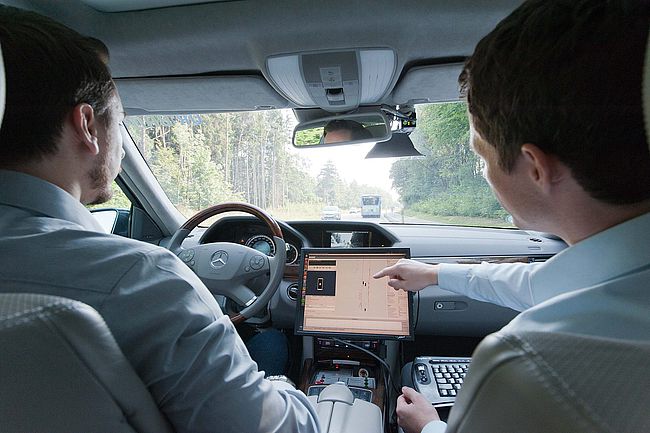
Bachelor of Science (BSc)
Communications and Computer Engineering
More about the course
Information technology, security of hard- and software, communications technology, computers, robots, the internet of things, embedded systems, human–machine interface, clouds: The common thread of these and many other leading-edge technologies and developments is the fact that they cannot be managed by information technology or computer science nor electronics or electrical engineering alone. The technologies of today’s information society reside at the intersection between electrical engineering and computer science. Their development thus requires the expertise of professionals who are at home in both worlds – communications and computer engineers fill this niche perfectly.
Bachelor of Science (BSc)
- Full-time
- each winter semester
- German
- No restriction
180
6
Programme structure Communications and Computer Engineering BSc
This diagram is a simplified illustration. You can find detailed information on our current study curriculum
Programme content
The bachelor's programme in Communications and Computer Engineering qualifies students for a scientific master's programme or for professional fields that involve the design and development of complex information systems, such as in the areas of embedded systems, communication technology and technical Computer Science.
(Study/degree) programme teaches analytical, creative and design skills in the core subjects of Electrical Engineering and applied Computer Science. Fundamentals of the programme are modules in Mathematics, Physics, Electrical Engineering and Computer Science. The focus is on the core subjects of information systems engineering, which provide students with an in-depth understanding of these disciplines.
Study objectives
Our students know the properties of electronic components and are able to design digital circuits and weigh up their implementation properties. They are able to analyse deterministic and stochastic signals as well as linear time-invariant systems. You will be familiar with modern high-frequency transmission technology and be able to analyse and develop computer networks. They understand the requirements of embedded systems and can develop them.
In the compulsory elective area, modules from Computer Science and Electrical Engineering are combined, particularly at the interface between the two disciplines. Knowledge from the fields of information and communication technology, bioinformation technology and distributed systems is used here.
Graduates acquire skills for independent projects and presentations through additional qualifications in business administration, English language and teamwork.
Programme structure
The Bachelor's degree in Communications and Computer Engineering has a predetermined timetable, which allows more freedom of choice in the composition of subjects as the semesters progress.
The course focuses on the basic subjects of Electrical Engineering and Computer Engineering, such as general electrical engineering and general computer science, analogue and digital circuits, electronic components, signals and systems, high-frequency technology, computer architecture and networks, embedded systems and operating systems. These are supported by modules from Mathematics. Further specialised knowledge can be deepened in the compulsory elective area.
Particular emphasis is placed on teaching additional qualifications in the areas of English language, presentation techniques and team and communication skills. With the bachelor's thesis, students demonstrate that they can work scientifically under supervision.
Study situation
The ratio of teaching staff to students in the Engineering study/degree programmes at Ulm University can be described as excellent. Exercise groups and tutorials are organised in small groups, the formation of learning groups is specifically encouraged and additional offers such as learning lounges and the use of electronic communication and learning platforms make it easier to get started in this versatile subject, especially in the first semesters. There is a trusting relationship between students, professors and teaching assistants. The commitment of both lecturers and student tutors from higher semesters is high and focussed on the academic success of each individual student.

Communications and Computer Engineering
The degree programme combines the most important content from Electrical Engineering with Computer Science. And when it comes to internships, you will find some of the world's leading companies and global corporations here
Routes abroad
A great way to broaden your horizons in a discipline is to study at a foreign university. Ulm University students can apply for one or two semesters abroad at numerous universities, both throughout Europe as part of the ERASMUS programme and outside Europe. If lectures are not required, internships and theses at other universities are also possible.
Ulm University has exchange agreements with over 100 universities in 26 countries.
International Office

What students say
Tim tells us:
My path to studying Communications and Computer Engineering - experiences & advice
Studying at Ulm University
Closing ceremony at Münsterplatz
A Brief Introduction to Ulm and Ulm University
Studying and living in Ulm
Welcome to the most liveable city in Germany. In Albert Einstein's birthplace, scientific research, leisure, top employers and culture come together in a unique way. Top locations and events such as the Ulmer Zelt, Nabada or the Donaufest attract visitors to the quaint streets. Here you feel at home!
Copyright: City of Ulm

